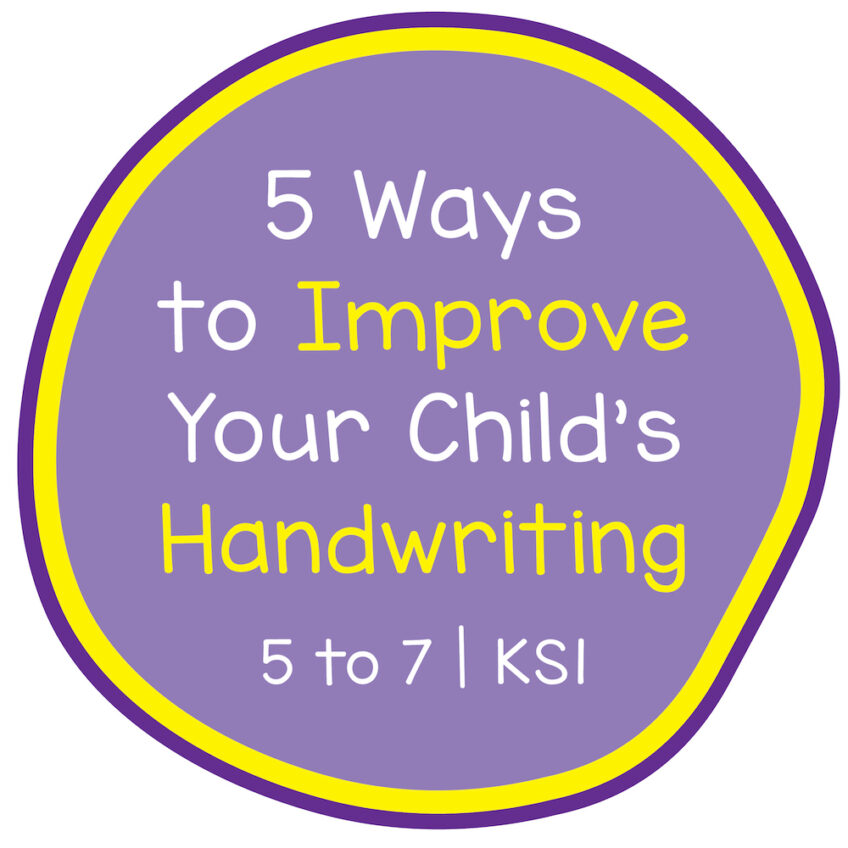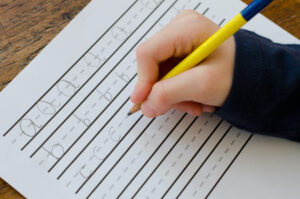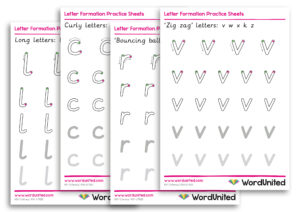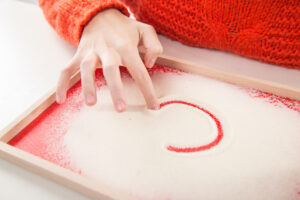No products in the cart.
5 Ways to Improve Your Child’s Handwriting (5 to 7 years | KS1)
February 22, 2023

If you are a parent of a child aged 5 to 7, you know how important it is to help them develop good handwriting skills. It’s crucial to give them the tools and techniques they need to build a foundation for their handwriting skills. In this blog, we will look at five ways to help children improve their handwriting and provide you with useful tips and resources. Let’s dive in!

Proper Grip
Developing a proper grip is crucial for children who are beginning to learn how to write. A proper grip not only helps children write more accurately, but it can also help prevent hand fatigue and discomfort. Encourage them to hold their writing tool with their fingertips and use a tripod grip (using their thumb, index, and middle fingers). You can also try using tools like pencil grips, which can help promote proper finger placement. Another fun way for children to practice their grip is colouring books. Encourage your child to hold the crayon or marker properly and use light, gentle pressure to colour in the lines.

Hand and Finger Strength
Having strong hands and fingers can help children hold a pen, apply the right amount of pressure while writing, and maintain good posture. There are many ways to build hand and finger strength, such as using play dough, squeezing stress balls and playing with building blocks. Outdoor activities such as climbing or swinging on monkey bars are also great. Fine motor skills activities are another way to strengthen child’s hands and fingers. Try including simple activities such as cutting with scissors, stringing beads, or lacing.

Letter Formation
Letter formation is the process of learning how to write letters of the alphabet, including their shape, size, and spacing. It is an important skill for children to develop because it makes their writing easier to read and allows them to write faster. There are many ways to practice letter formation. One effective way is to use handwriting worksheets with guided practice for each letter of the alphabet. You can find these practice sheets online or in handwriting books. Another way is to use a chalkboard or whiteboard to practice letter formation. This provides a larger writing surface and can help children focus on the movement and shape of each letter. The Write & Wipe Flashcard Kit is a great letter formation resource for younger children. It allows them to become familiar with writing the strokes in the correct order and provides plenty of practice.

Consistent Practice
It’s important to encourage your child to practice writing every day, even for just a few minutes. It can help them develop their fine motor skills and build their confidence in writing. You can vary the types of exercises and writing activities your child does to keep things interesting. Include letter tracing and writing, sentence copying, and short story writing. There are also many resources that include engaging activities and themes to keep kids motivated. Online tools that have been carefully selected can also be an excellent addition.
The Letterland books link abstract letter shapes to child-friendly images that serve as cues. This makes it easier for children to remember the letter shapes and avoids confusion. Letterland’s Handwriting Practice 3 workbook is aimed at KS1 students and teaches them how to form letters and join them to write words. It also provides plenty of pages where children practise words they often come across in their daily life.
“Handwriting Made Easy” is another excellent handwriting practice book series. These books, which include Printed Writing and Joined-Up Writing, are designed for children to learn at home. It helps them develop a neat, consistent, and fluid style while also providing parents with helpful notes and tips.
Free printables can be a great addition to a handwriting book’s structured approach. Be sure to check out our Handwriting Practice Sheets, they include 26 lowercase letters and lines for tracing and independent writing.

Make it Fun!
Finally, make sure you keep children engaged and motivated to practise handwriting. There are many ways to make handwriting practice engaging, such as using colourful pens, markers, pencils, or stickers. Writing letters in sand, foam, or on a light board can be fun and engaging. Different textures help children develop their sensory skills and make writing more fun and engaging.
We also recommend Mrs Wordsmith ABC Handwriting Book. It is designed for children who don’t like writing but enjoy reading stories. Children practise writing letters while following Bogart the baby fly as he chomps his way from A to Z. Asking children to write about topics that interest them can help them feel more invested in the writing process and keep them motivated. All About Me is a great fill-in activity book, where children are encouraged to write about their life, family, hobbies and dreams.
We hope you found these tips helpful, and don’t forget to encourage your child and make the practice as enjoyable as possible!



 01782 698558
01782 698558

